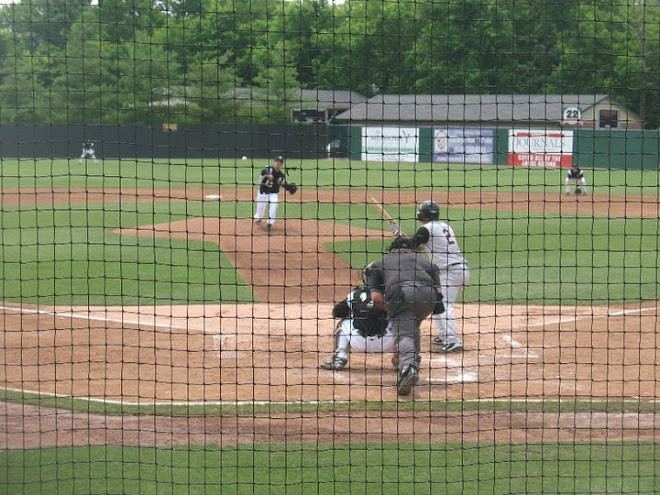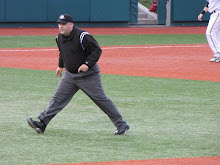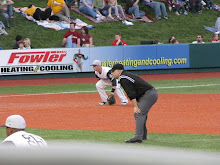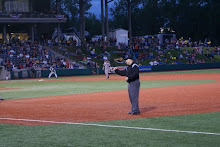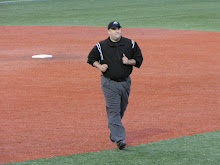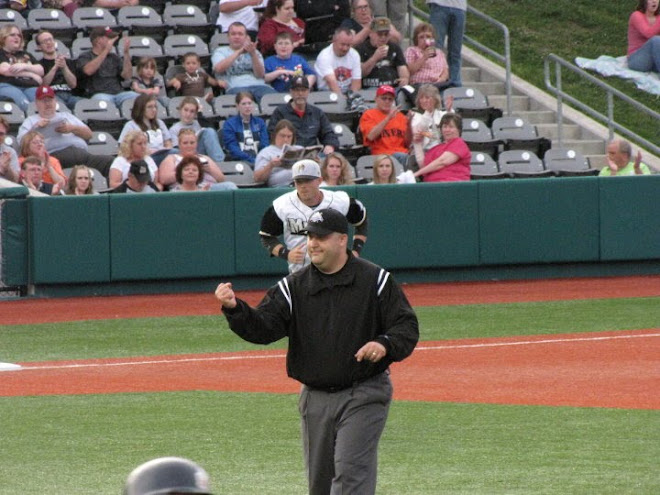Wednesday, September 29, 2010
What's the call
Batter hits a line drive up the middle. It hits the pitching rubber and bounces into foul territory before it passes a base. It then is touched by the third basemne in foul territory. Is this a fair or foul ball?
Tuesday, September 28, 2010
Big Weekend
This weekend is my evaluation weekend for the Midwest Umpires Association. I have two games to prove to them that I am capable of working some of their higher level college games. I'm not sure exactly what this will lead to but hopefully it will be some better ball.
The games I am doing are part of a Pastime Baseball Tournament. I don't know much about this orgbanization. Hopefully, it will be good.
The only thing I do know if that I will have 4-6 senior umpires evaluating my every move. So, wish me luck.
I'll post a full report on my double header Saturday night.
The games I am doing are part of a Pastime Baseball Tournament. I don't know much about this orgbanization. Hopefully, it will be good.
The only thing I do know if that I will have 4-6 senior umpires evaluating my every move. So, wish me luck.
I'll post a full report on my double header Saturday night.
Monday, September 27, 2010
The Importance of Not Assuming
The other day, I had something happen that I have only seen happen a few times in 20 years and it almost caught me off guard. Here’s the play:
Runner on 2nd, two outs. The ball is hit to the first basemen who fields the ball and starts walking to first base. This should be an EASY OUT!! In an effort to look cool he flips the ball to the pitchers mount…..only one problem…..he did it BEFORE he stepped on the base. Now, I almost signaled out but somehow I stopped myself and just stayed put and looked at the bag. The first base coach figured out what I was waiting on and told the runner to run. The runner touched first and I signaled safe. In the meantime, the runner from second rounded third and scored.
Needless to say, the coach went nuts and wasn’t in the game for very long after this but that’s a discussion for another day. The point of telling you this story is to once again remind you that timing is one of the most important aspects to being a good umpire. If my timing would have been too quick, I would have called him safe but since I take a second or two to make my calls, I was able to better process what I had just seen.
Remember, the quicker you are, the more likely you are to make a mistake. You will rush to call out before you make sure the ball is caught, or my favorite, you will call out and signal safe. Slow down and remember….see the play, make the call in your head, make the call. There should always be around a second in between the end of the play and your call. I guarantee you that you will get more calls right if you do that.
On a side note, I am considering putting some video training videos up in the next few weeks. I think it would be a good way to go over the correct positioning in the field and behind the plate. I have often found that I learn better by seeing rather than reading so maybe that will help someone looking for some pointers as well. Let me know if you think that is something you might be interested in.
Thanks again for reading and please spread the word about my blog. I appreciate it. Lastly, remember, you only get one chance to make a first impression. Make sure the one you make when you step on the field is the right one. Look professional and act professional. PLAY BALL!!!!
Runner on 2nd, two outs. The ball is hit to the first basemen who fields the ball and starts walking to first base. This should be an EASY OUT!! In an effort to look cool he flips the ball to the pitchers mount…..only one problem…..he did it BEFORE he stepped on the base. Now, I almost signaled out but somehow I stopped myself and just stayed put and looked at the bag. The first base coach figured out what I was waiting on and told the runner to run. The runner touched first and I signaled safe. In the meantime, the runner from second rounded third and scored.
Needless to say, the coach went nuts and wasn’t in the game for very long after this but that’s a discussion for another day. The point of telling you this story is to once again remind you that timing is one of the most important aspects to being a good umpire. If my timing would have been too quick, I would have called him safe but since I take a second or two to make my calls, I was able to better process what I had just seen.
Remember, the quicker you are, the more likely you are to make a mistake. You will rush to call out before you make sure the ball is caught, or my favorite, you will call out and signal safe. Slow down and remember….see the play, make the call in your head, make the call. There should always be around a second in between the end of the play and your call. I guarantee you that you will get more calls right if you do that.
On a side note, I am considering putting some video training videos up in the next few weeks. I think it would be a good way to go over the correct positioning in the field and behind the plate. I have often found that I learn better by seeing rather than reading so maybe that will help someone looking for some pointers as well. Let me know if you think that is something you might be interested in.
Thanks again for reading and please spread the word about my blog. I appreciate it. Lastly, remember, you only get one chance to make a first impression. Make sure the one you make when you step on the field is the right one. Look professional and act professional. PLAY BALL!!!!
Question of the Day
Runners on first and second, no body out. Batter hits a fly ball to short left field. THe Shortstop is able to get under the ball easily and makes the catch on the outfield grass behind short. Can this be considered an infield fly?
Friday, September 24, 2010
An Umpire For Instant Replay
A couple of years ago I was asked what I thought about instant replay in baseball. At the time, stated that there is no way that baseball needs instant replay. Missed calls are part of the game. Well, during the past two years, my opinion has completly changed. Today, I feel that instant replay is needed in baseball.
Why the change of heart? Well, it's simple, as an umpire, our goal is to get the call right. Instant Replay allows us to do that. There is no reason not to use the technology (most of which is already in place) to make sure that the game is being called as fair as possible. I also feel that if instant replay is good enough to tell if a ball is a homerun or not, why is it not good enough to help with fair and foul calls and close plays at the bag. There is no good reason anyone can give me that this wouldn't be a good thing for the game.
People are getting sick and tired of saying the missed calls are part of the game. I know I am. I want to see the calls made correctly, especially since everytime a call is missed, there are 20 angles of the play showing that they umpire was wrong. In football, sometimes you can't get the right view of a replay but at least they try. In baseball, I seriously doubt that there will be many plays that a camera won't show the correct call.
In this year alone, missed calls have cost a guy a perfect game, have allowed a player to act like he was just shot in the hand and get awarded first base and called a fair ball foul down the third baseline that would have ended the game if called correctly. These are just a few calls but in every one of these cases, if instant replay was allowed, the calls would have been overturned.
Umpires aren't perfect, not are any official. Mistakes happen but there needs to be a way to limit them.
Here is my proposition for instant replay in baseball. First off, balls and strikes are OFF LIMITS. That is one thing I am against changing. Why? Well, I honestly believe that umpires do a great job of calling balls and strikes. Plus (I may be wrong on this) I believe the camera that show the srike zone are not directly behind the pitchers mound do they are not 100% accurate.
Ok, Balls and strikes are off limits but everything else is allowed. Out/safe, fair/foul, catch/no catch. Everything. Each team is given two challenges a game. If you use the challange and get it right, you don't lose the challange. If you use the challenge and are wrong, you lose a challenge and lose a trip to the mound the next inning.
I feel that this would allow managers the option to use one early and not feel like they have to save it till the end of the game.
Also, I would add a 5th umpire to every crew (baseball can afford it). This 5th umpire (whoever it is each night) sits in the booth and would do reviews. I bet it would only take a minute on 90% of the calls.
Well, that's might opinion, what do you think?
Why the change of heart? Well, it's simple, as an umpire, our goal is to get the call right. Instant Replay allows us to do that. There is no reason not to use the technology (most of which is already in place) to make sure that the game is being called as fair as possible. I also feel that if instant replay is good enough to tell if a ball is a homerun or not, why is it not good enough to help with fair and foul calls and close plays at the bag. There is no good reason anyone can give me that this wouldn't be a good thing for the game.
People are getting sick and tired of saying the missed calls are part of the game. I know I am. I want to see the calls made correctly, especially since everytime a call is missed, there are 20 angles of the play showing that they umpire was wrong. In football, sometimes you can't get the right view of a replay but at least they try. In baseball, I seriously doubt that there will be many plays that a camera won't show the correct call.
In this year alone, missed calls have cost a guy a perfect game, have allowed a player to act like he was just shot in the hand and get awarded first base and called a fair ball foul down the third baseline that would have ended the game if called correctly. These are just a few calls but in every one of these cases, if instant replay was allowed, the calls would have been overturned.
Umpires aren't perfect, not are any official. Mistakes happen but there needs to be a way to limit them.
Here is my proposition for instant replay in baseball. First off, balls and strikes are OFF LIMITS. That is one thing I am against changing. Why? Well, I honestly believe that umpires do a great job of calling balls and strikes. Plus (I may be wrong on this) I believe the camera that show the srike zone are not directly behind the pitchers mound do they are not 100% accurate.
Ok, Balls and strikes are off limits but everything else is allowed. Out/safe, fair/foul, catch/no catch. Everything. Each team is given two challenges a game. If you use the challange and get it right, you don't lose the challange. If you use the challenge and are wrong, you lose a challenge and lose a trip to the mound the next inning.
I feel that this would allow managers the option to use one early and not feel like they have to save it till the end of the game.
Also, I would add a 5th umpire to every crew (baseball can afford it). This 5th umpire (whoever it is each night) sits in the booth and would do reviews. I bet it would only take a minute on 90% of the calls.
Well, that's might opinion, what do you think?
Wednesday, September 22, 2010
Tip of the day
When I first started getting serious about umpiring about 12 years ago, I attending my first camp. It wasn't anything special, just some of the local high school umpires helping the younger umpires in the area. It was here that I was first taught that when you are behind the plate and the catcher takes the inside corner, you should look at the pitch from directly over the head of the catcher.
This technique allows you to see the pitch and still see the outside corner; however, it leaves you wide open to get drilled by foul balls. This really wasn't a problem for me a few years ago but this past year, I went through a two week stretch where I had about 20 balls fouled off my mask in a two week stretch. It was really getting to be annoying.
It was then that I emailed a buddy of mine who is working AA ball right now. He told me that the minor league umpires are now being taught to go even further inside when the catcher takes the inside corner of the plate. When he first told me that, I thought he was crazy. How could you possibly see the outside corner from that position? Well, I tried it and to my surprise, I still was able to call the outside corner. Sure, it was a little more difficult at first, but once you get used to it, it isn't that much of an issue and most importantly, you aren't getting hit right in the kisser by a foul ball.
So, for all of you out there who are tired of having to wipe the ball marks off your mask, try this and I guarantee that once you get used to it, it will be no different from calling the pitch from over the top.
Stay consistent out there and remember that angle is more important than distance and never forget your......timing. PLAY BALL!!!
This technique allows you to see the pitch and still see the outside corner; however, it leaves you wide open to get drilled by foul balls. This really wasn't a problem for me a few years ago but this past year, I went through a two week stretch where I had about 20 balls fouled off my mask in a two week stretch. It was really getting to be annoying.
It was then that I emailed a buddy of mine who is working AA ball right now. He told me that the minor league umpires are now being taught to go even further inside when the catcher takes the inside corner of the plate. When he first told me that, I thought he was crazy. How could you possibly see the outside corner from that position? Well, I tried it and to my surprise, I still was able to call the outside corner. Sure, it was a little more difficult at first, but once you get used to it, it isn't that much of an issue and most importantly, you aren't getting hit right in the kisser by a foul ball.
So, for all of you out there who are tired of having to wipe the ball marks off your mask, try this and I guarantee that once you get used to it, it will be no different from calling the pitch from over the top.
Stay consistent out there and remember that angle is more important than distance and never forget your......timing. PLAY BALL!!!
Get something off my chest
You know there has really been something that has been bothering me this year on the little league level this year. The players have absolutely no respect for the umpires anymore. They argue, they look back, they throw their helmets and just plain act like a bunch of fools and you know the worst part, most of the time the coaches and parents do nothing. Something needs to change.
When I was a kid, I played on the highest level in the county I lived in. It was very competitive but I can tell you, you almost never saw a kid argue with an umpire. It just didn't happen. If it happened, the parents and coaches would be all over the kid and he would mostly likely be benched. Sure, the coaches got into arguments from time to time but even that didn't happen too much.
About two weeks ago, I was umpiring a 12 year old boys game. I struck a kid out on a pitch on the outside corner of the plate. I had called the previous two pitches strikes that were in the exact same spot. He looks back at me and says, "Are you freaking kidding me?" Then he kicks the dirt and walks off. I didn't want to throw a kid out of the game so I walked after him telling the coach that I am warning his bench that I am not going to put up with that. The Coach told me that wasn't my job. Really? Controlling the game isn't my job? Interesting. Now, if that had happened when I played, the umpire wouldn't have had a chance to chase me down because I would have been pulled out of the game right away.
Situations like this have come up all the time this summer and I'm not exactly sure what the answer is (outside of lining all the coaches and parents up and screaming at them). I am pretty thicked skinned but there is something about a 10-14 year old arguing with me that really gets me fired up. My philosophy from here on out will be to not put up with it at all from the kids. Maybe with I chuck a couple, they will calm down.
Anyways, if you have any stories about this or thoughts, please post them. I would love to know that I'm not alone in seeing this change.
When I was a kid, I played on the highest level in the county I lived in. It was very competitive but I can tell you, you almost never saw a kid argue with an umpire. It just didn't happen. If it happened, the parents and coaches would be all over the kid and he would mostly likely be benched. Sure, the coaches got into arguments from time to time but even that didn't happen too much.
About two weeks ago, I was umpiring a 12 year old boys game. I struck a kid out on a pitch on the outside corner of the plate. I had called the previous two pitches strikes that were in the exact same spot. He looks back at me and says, "Are you freaking kidding me?" Then he kicks the dirt and walks off. I didn't want to throw a kid out of the game so I walked after him telling the coach that I am warning his bench that I am not going to put up with that. The Coach told me that wasn't my job. Really? Controlling the game isn't my job? Interesting. Now, if that had happened when I played, the umpire wouldn't have had a chance to chase me down because I would have been pulled out of the game right away.
Situations like this have come up all the time this summer and I'm not exactly sure what the answer is (outside of lining all the coaches and parents up and screaming at them). I am pretty thicked skinned but there is something about a 10-14 year old arguing with me that really gets me fired up. My philosophy from here on out will be to not put up with it at all from the kids. Maybe with I chuck a couple, they will calm down.
Anyways, if you have any stories about this or thoughts, please post them. I would love to know that I'm not alone in seeing this change.
Tuesday, September 21, 2010
What's the Call??
Runners on first and third, one out. Pitcher steps on the rubber and takes his sign. As he is coming set, he drops the ball. It rolls down off the mound and stops in fair territory. The runner for third breaks for home and is thrown out by the pitcher. The runner on first, tries to go first to third and is thrown out at third. What's the call?
Post your answers below and I'll post the correct answer later today or first thing tomorrow.
Post your answers below and I'll post the correct answer later today or first thing tomorrow.
Subscribe to:
Comments (Atom)
